- Home
- Tim Lebbon
RIME (Kindle Single) Page 5
RIME (Kindle Single) Read online
Page 5
“I am a friend of the being you killed.” It sounded so sad, so stricken with grief.
“I’m sorry,” I said.
“Sorry?”
“Yes. I didn’t mean harm. I was scared.” I walked on into silence. At the end of the passageway another door opened, and I looked out onto Cradle’s main control area.
Bridge was surprisingly small, arrayed with computer displays and control panels, but very few seats. Around the circular room were wide, tall viewing windows, offering what should have been a panoramic view out into the void.
The thing outside obscured the windows.
“Sorry?” the thing repeated.
“Yes,” I whispered.
“Your sorrow is only just beginning.”
An ice-cold fist closed around my heart as the door behind me closed, trapping me on the bridge, more alone than ever before.
* * *
“Luke will be here again soon,” Olivia says. The questioning has continued. I don’t think Luke believes me. I’m equally certain that Olivia does, but wishes she did not.
“When are you due to be married?”
“Three weeks ago,” she says.
“Oh. I’m sorry. Because of me?”
She shrugs. “Some things are more important. We have a new date, nine weeks from now. The church can wait.”
“You’re not a believer.”
“Luke and his family are. Doesn’t bother me either way.” Those aliens are a solid presence between us. They always are now. She understands so much more than Luke with his computer programmes and modelling networks, his rejection of many facets of my story simply because it doesn’t fit with known facts, does not ‘model well’. Olivia understands me. There’s something in that––her outlook, her interest, the way she looks at me and the pressure that seems to pulse between us when we’re together––that I recognise, and it troubles me. I’m sure she understands. To me, Geena has been dead for a matter of days, not many centuries.
“When do I get to speak to other people?” I ask.
“After the trial.”
“What, before you throw me in the loony bin?”
She glances away towards a spread of rapids in the nearby river. We have come down from the tower again. I like to do this most days now, as the trial draws near. I’m starting to relish this freedom I should never have had.
“No such thing as madness anymore,” she says after a pause, probably to have what I’d said silently translated for her. “We make modifications.”
“To the brain?”
“Well, yes,” she says, as if surprised I could ever think otherwise.
“Are you modified?”
Olivia seems not to hear. I decide not to ask her again.
“So where do you draw the line?” I ask.
She frowns. I wonder if any lines are drawn in this new world. Sometimes when they say ‘trial’ I hear it with a capital T, as if that itself is an oddity.
“Forget it, doesn’t matter,” I say. “So what happens to me after the trial? If I’m found guilty? If there’s no loony bin, where can you dump this mad spaceman from thousands of years in the past?” I’m trying to inject some humour because suddenly she’s grim, her beautiful eyes hooded and sad.
“Guilty of seventeen million deaths?” she asks, as if that requires no answer.
And suddenly I don’t want one.
Luke arrives soon after, bringing food and drink with him, as well as the floating device I’ve come to know so well. It’s his interface, and everything I say and do is input by him. He records comments and facts with a blink or a wave of his hand.
“I have some questions,” he says, foregoing any form of greeting.
“Not yet,” I say. “Olivia and I were talking.” He glances between us. It’s a crass play on my part, but I enjoy the brief flash of jealousy in his eyes.
“We’ve finished,” Olivia says. She walks towards the riverbank, and when a breeze blows up it pulls a mist of spray from the rapids and across her. She lifts her face to the sky, relishing the coolness.
“How did it know your language?” Luke asks me.
I sigh. Yet I’m strangely happy to return to the subject of the being and what happened next on Cradle. Perhaps because that was the last time I ever felt close to Geena. The last time I knew for sure that she was still alive.
“I don’t know,” I say. “There’s so much I don’t understand about it. So many blank spots that still don’t make sense. You should realise that by now.”
“I just think it’s convenient that the thing you claim responsible for so much was able to communicate in your own language. Explain to you––so you can explain to us––why it did what it did.”
“Oh, it never said why,” I say. “Not really even how. That’s all guesswork on my part. You should try guessing, sometime. It’s liberating to use your brain.”
Luke waved a hand. His floating device glowed.
“You’re guessing a lot of this?” he asked.
I smile. “Maybe.”
“That’s not useful.”
I shrug.
“You’re enjoying this, aren’t you?” Luke says, voice lowered so that Olivia can’t hear, and that makes me certain that he has no real inkling, no shred of understanding about what I’ve been through, what I’ve lost.
I look at Olivia, beautiful Olivia.
“You fool,” I say.
Luke waves at his interface.
I sigh once more and continue my story.
* * *
Bridge was never designed for real human interaction. There were a few wheeled chairs scattered around, and several control panels with various forms of input––keyboards, disc slots, wired sockets. But the bulk of the area was taken up with equipment that seemed to run itself. Perhaps this was the true centre of Cradle. Or maybe Cradle had no centre. I didn’t know or even care, because Cradle had abandoned me.
“Are you going to kill me?” I asked.
“Why?”
“For what I did.”
It seemed to consider this for some time. There was movement across the viewing windows, but it was difficult to see. I caught it only from the corner of my eye. Looking directly at it, I saw only a dull, solid blackness. I remembered the things seeming to glow and flash with strange lights or reflections. Perhaps in mourning, this one was now grey and bland.
“Why would killing you make anything better?”
“It hasn’t stopped you from killing almost everyone else.”
“They were dead already.”
“No. They were asleep.” I frowned, then corrected myself. “They were suspended.”
“And I set them free.”
“You’ve killed them! Millions of souls, millions, and they were our great, last hope. You’ve no idea what you’ve done.”
“I have every idea,” the voice said. “You blame me for murdering millions, but your lives are the blink of an eye. What worth in that?”
“What gives you the right?” I asked. I was afraid, but furious. This thing seemed to have no idea what it had done. Or if it did understand, it enjoyed it.
“What gave you the right?” it asked. “You killed the oldest of us. Over a billion of your years old, and you blasted it apart. Do you have any idea how much knowledge died in that instant? How much experience? I heard the universe cry.”
I was shocked by what it had said, but also incensed.
“You weigh that against all these deaths?”
The voice did not reply.
“What do I call you?”
“I have no name. Make up your own.”
“I am sorry,” I said. “But …” I didn’t know how to verbalise what I felt. The horror of being cut off from Cradle and left alone with this thing was evaporating, and in its place I felt nothing. That void was worse. I would have welcomed back the terror, and a hundred times greater.
“In so long, you are the first species ever to do us harm.” Its voice was filled not only
with sadness, but also confusion. “That makes you dangerous. That makes you not ready to be here.”
“Here?”
“Away from where you belong. You’ve done something awful. Such a terrible thing, such pain.” It sounded so wretched that I started to cry.
“I was afraid.”
“And now we are too,” it said. They were the last words the alien, creature, god ever spoke to me.
The door behind me whispered open, and a crackling sound began. I looked around, startled, expecting to see the walls buckling; the ceilings cracking as the being at last began to tighten its grip. But then I realised that the sound was inside my head, and then words began to whisper their way through.
“… lifeless… fallen, all of them, and … trouble communicating … not sure I can…”
“Cradle?” I asked.
“Yes,” it said, and its voice had never been more welcome. It sounded relieved. “The alien didn’t kill you. I lost you for a while, didn’t know what was happening. Lost you. I’ve never lost anyone before.”
“What’s happened?”
“The alien beings are moving away, rapidly. Already out of sight of my scanners. Ship’s main drive and other systems are coming back online. But there’s a problem.”
“What problem?”
“All of them have fallen.”
“All of who?” I thought of Geena watching me go, her final words to me, and I realised that I’d let her down. There had never been any hope of me making things better.
“The dead that walk. They walk no more.”
All those millions, I thought. It wasn’t only millions who had died, it was the hope of humanity. The great hope of survival.
“How many died in their pods?” I asked.
“Very few. All of them opened, and about ninety-eight percent of the occupants left. They wandered for a time. They’re everywhere.”
“All those millions,” I said.
“There’s more,” Cradle said. “The cryo-gel was never designed for contact with the atmosphere. It’s been instantly corrupted. The dead are already beginning to rot.”
“What can we do about them?” I asked. I had no real concept of what so many corpses would look like, or smell like, but I knew about corruption. The food techs talked about it all the time, because it was such a danger on the ship. We were not built to fight infection. Cleanliness was drummed into us.
“Clear them away,” Cradle said. “But that’s impossible. By my estimate, there is now three hundred thousand tonnes of decaying biological matter scattered throughout Cradle.”
“We have to try!” I said.
“No.”
“Yes! What do you mean, no?”
“I mean it’s all over. My purpose and yours have vanished. Even if we did reach Canis Major, there’s only the crew left alive. Three hundred, and many of those will be dead in days, weeks at most. That’s not a sufficient gene pool with which to seed a new civilisation.”
“We can’t just give in!” I said, but right then I couldn’t see what else we could do.
“I can carry on,” Cradle said. “I can travel on, either following our programmed route, or deviating elsewhere.”
“What about us? What about me?”
Cradle did not answer. The silence was loaded and dark.
“Where would you go?” I asked.
“Perhaps I’ll follow them.”
“You can’t just give up on us. We’re why you’re here!”
Silence again from Cradle. I wasn’t used to that, it always answered, open and honest. These silences suggested secrecy, a scheming personality. More than ever before, at that moment I saw Cradle as almost human.
“We’ll take over the ship,” I said. “Override your systems, assume manual control. We can do it, you know. We’ve been here long enough; we know enough about the ship. And you were built to serve us.” The more I said, the more possible it seemed. All the ship’s systems were linked into Cradle, but if the AI were disassociated from these systems, we could reprogramme them ourselves. Steal the ship. We would become the intelligence controlling our destiny.
“And three hundred is more than enough. We’ll encourage multiple births. We’ll reach Canis Major in a dozen generations, inhabit, build afresh, and––”
“Oh,” Cradle said. There was enough implied in that single syllable to halt me in my tracks.
“What is it?”
“They’ve come back.”
* * *
“You must understand, it wasn’t just those on Cradle losing hope,” Olivia says. “It was everyone. It was all humanity. When the yearly signals from Cradle ceased, the Earth was falling ever deeper into the pits of despair and hopelessness. So much had gone wrong, and even worse was happening––the wars and chaos, the famine and contagion. Most people agreed that humanity had reached the point of no return.”
“You still turned things around,” I say.
“It’s amazing, isn’t it?”
“But how? If things were so bad, how did everything manage to grow?” I wave my hand at the expansive window and the stunning views beyond. The Amazon rainforest, though largely deforested now, was still one of the most fertile regions on the planet. The Earth’s farm, Olivia had called it the day before. “… so much better?”
“The people of Earth lost their crutch,” Luke says. He’s standing over by the table, picking at food that was brought in an hour before by a couple of hovering drones. The variety of foodstuffs on offer still shocks me. I’ve taken a simple bowl of fruit––two types, I couldn’t face a dozen possible choices––but Luke is grazing, picking small tidbits from here and there. I wonder what happens to all the food we won’t eat. I don’t even want to ask. On Cradle, everything was recycled, including all human waste and, when the time came, the bodies of those who died. Nothing was thrown away. We could not afford such loss.
Until the end, of course. That was when all recycling ceased, along with everything else.
“What do you mean?”
“It was a long time ago,” Luke said, popping a soft fruit between his teeth. “Way before our time, so it’s difficult to know for sure. All records point to the fact that Cradle’s loss galvanised a big effort to turn things around. Not in everyone, of course, but in those who mattered.”
“The scientists,” Olivia says. “The philosophers.”
“The politicians?” I ask.
Luke laughs out loud.
“No,” Olivia says, “not them. They were already lost. Politicians were busy overseeing wars and policies that made everything worse. It was the people who saved the world.”
A crass part of me wants to suggest that the tragedy I caused might have indirectly saved humanity from its final twilight. But even thinking that makes me feel sick. I can never be so stupid.
I’ve slept well these past few nights. My rooms are comfortable and well appointed, and although I understand that I’m a prisoner, nothing about my incarceration feels like punishment. Olivia and Luke visit me every day, and I’m aware that the trial draws near. They’re ensuring that I’m fit and well enough to stand trial, both physically and psychologically.
I’m not sure that either is the case.
“So what happened to Cradle’s story?” I ask.
“It faded away,” Luke says. “It’s more a myth now than anything else, just like plenty of stuff from before.”
“Cradle’s story is still taught to children,” Olivia says.
“Just another part of their history teachings,” Luke says.
“So when is the trial?” I ask. It’s been troubling me. They both make occasional passing mention of my trial, but neither of them seems eager to reveal anything firm. I don’t know its location, format, not even which laws will be in place, or what my charges will be.
Multiple murder, I sometimes think, and with that thought comes a memory of those terrible, final moments. Somewhere in that echo I hear Geena calling for help, or cursing my name.
> I blink, and Geena’s face is waiting for me in the darkness. She’s been dead for three thousand years, but to me it still feels like two handfuls of days. That knowledge makes my grief feel fake and self-indulgent. Everything about me is false. I’m a memory brought to life, a walking and breathing myth still taught to children.
I’ve taken to wondering whether the trial will be bypassed altogether, and perhaps my sentence has already begun. That wouldn’t be so bad. My rooms are nice, and as gaolers go, Luke and Olivia are kind and considerate.
“Let’s walk,” Olivia says, and as always when she suggests this I feel a pang of excitement. I see Luke’s response––a quick glance, his mouth down turned at the corners. I take great delight in standing, inviting Olivia to hook her arm through mine, and then walking out onto the balcony. Even though Luke does not join us, I glance back to see him talking quietly to one of the floating drones. By the time Olivia has called up the platform, the drone has joined us. I hear its soft buzzing in the background as we drop towards the ground, a whisper almost too quiet to hear.
I spent my whole life on Cradle being monitored by the AI, my location always known, my health and well-being tracked so that eating, drinking and sleeping habits could be regimented for optimum performance. It was rare that I’d even considered my lack of privacy. Indeed, I’d never liked being alone, and that first time in the plasma gun turret––cut off from everyone, even Cradle––had damaged me to such an extent that I still didn’t believe myself fully recovered.
This is different. Being spied upon, my every word and movement recorded, feels so wrong.
“Luke seems to have a stick up his arse today,” I say. If he doesn’t hear it immediately, I hope that he’ll listen to a playback of the recording.
“I’m sorry?”
“He’s pissed off about something.”
A moment passes while Olivia, or whatever she has implanted, translates the unfamiliar colloquialism. Perhaps she’s not as free as she makes out.
For the second it takes, I see her unguarded and open, frowning slightly, looking into the middle distance. She’s beautiful. I’ve noticed before, but this time her beauty hits at the heart of me. I think it’s because in some ways, it reminds me of Geena. A wave of sadness washes over me, and I turn away in the hope that Olivia doesn’t notice.

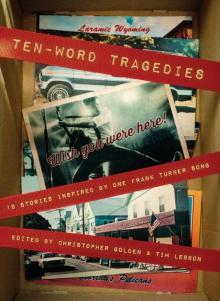 Ten-Word Tragedies
Ten-Word Tragedies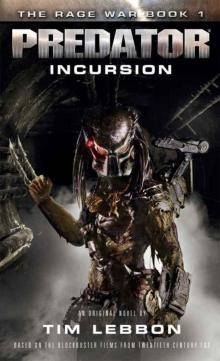 Predator: Incursion
Predator: Incursion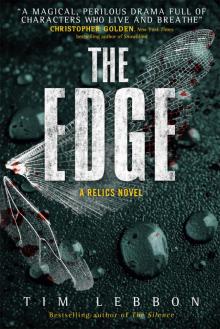 Relics--The Edge
Relics--The Edge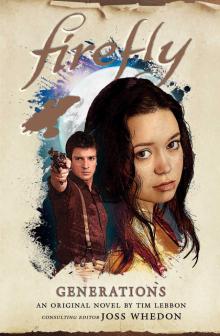 Firefly
Firefly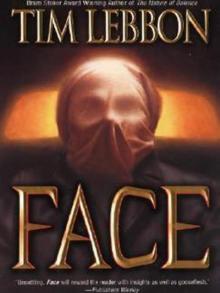 Face
Face Generations
Generations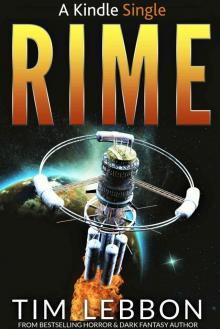 RIME (Kindle Single)
RIME (Kindle Single) Fallen
Fallen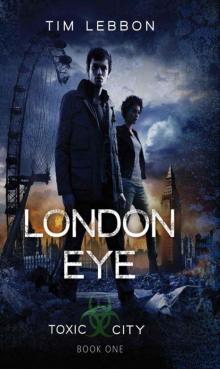 London Eye tc-1
London Eye tc-1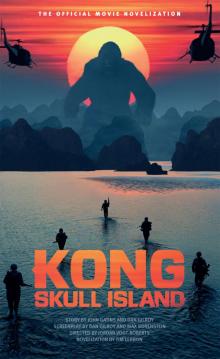 Kong: Skull Island
Kong: Skull Island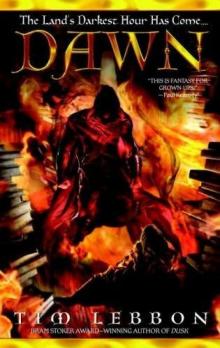 Dawn n-2
Dawn n-2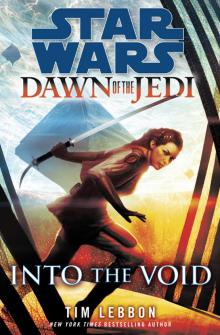 Into the Void: Star Wars (Dawn of the Jedi)
Into the Void: Star Wars (Dawn of the Jedi)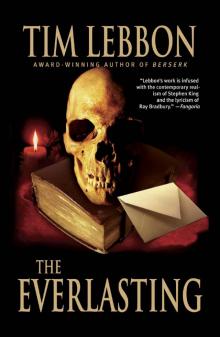 The Everlasting
The Everlasting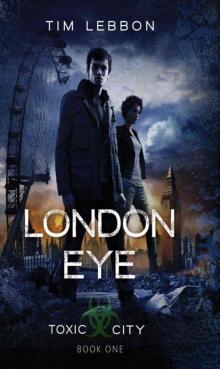 London Eye: 1 (Toxic City)
London Eye: 1 (Toxic City)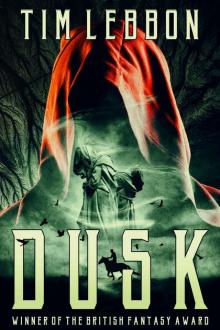 Dusk: a dark fantasy novel (A Noreela novel)
Dusk: a dark fantasy novel (A Noreela novel)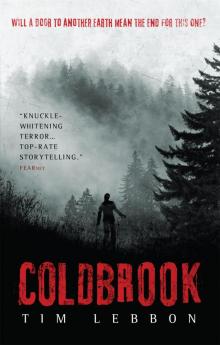 Coldbrook
Coldbrook Alien
Alien Dusk
Dusk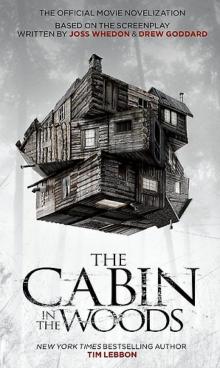 The Cabin in the Woods
The Cabin in the Woods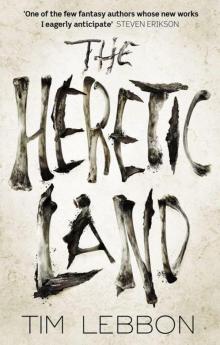 The Heretic Land
The Heretic Land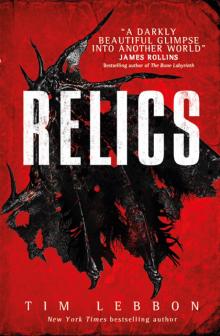 Relics
Relics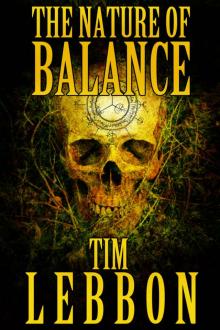 The Nature of Balance
The Nature of Balance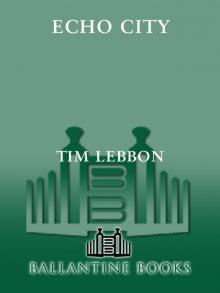 Echo City
Echo City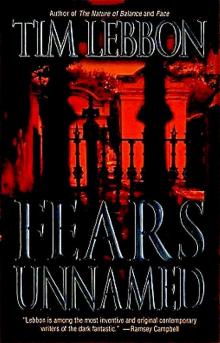 Tim Lebbon - Fears Unnamed
Tim Lebbon - Fears Unnamed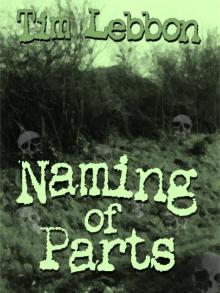 Naming of Parts
Naming of Parts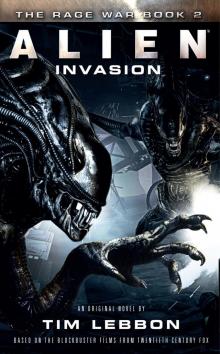 Alien--Invasion
Alien--Invasion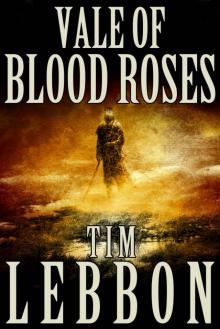 Vale of Blood Roses
Vale of Blood Roses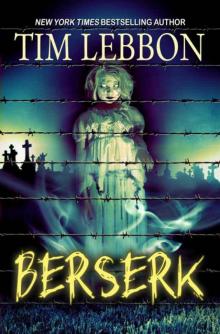 Berserk
Berserk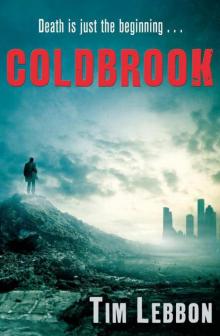 Coldbrook (Hammer)
Coldbrook (Hammer)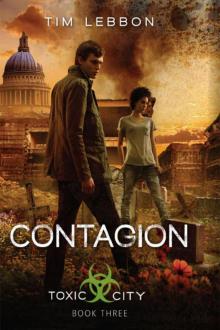 Contagion tc-3
Contagion tc-3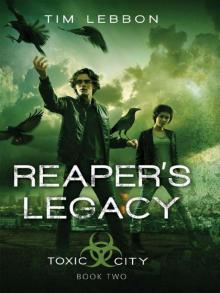 Reaper's Legacy: Book Two (Toxic City)
Reaper's Legacy: Book Two (Toxic City)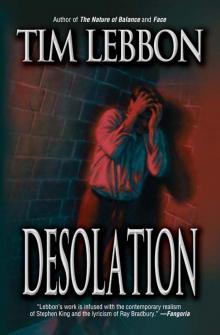 Desolation
Desolation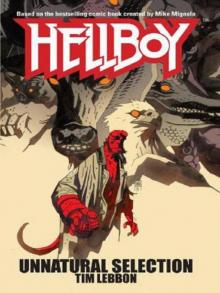 Unnatural Selection
Unnatural Selection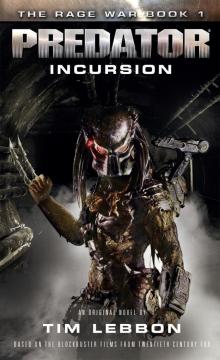 Predator - Incursion
Predator - Incursion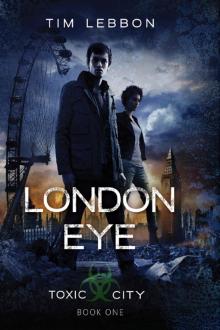 London Eye
London Eye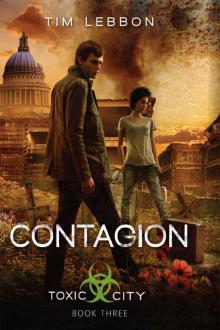 Contagion (Toxic City Book Three)
Contagion (Toxic City Book Three) The Silence
The Silence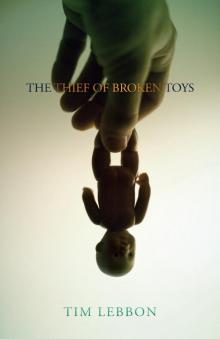 The Thief of Broken Toys
The Thief of Broken Toys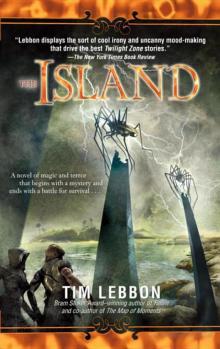 Tales of Noreela 04: The Island
Tales of Noreela 04: The Island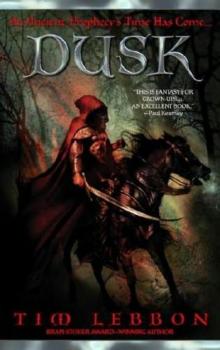 Dusk n-1
Dusk n-1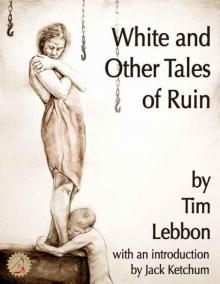 White and Other Tales of Ruin
White and Other Tales of Ruin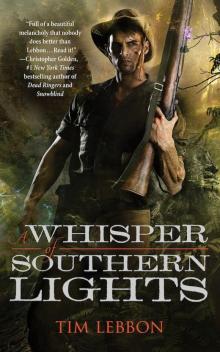 A Whisper of Southern Lights
A Whisper of Southern Lights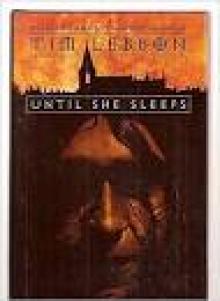 Until She Sleeps
Until She Sleeps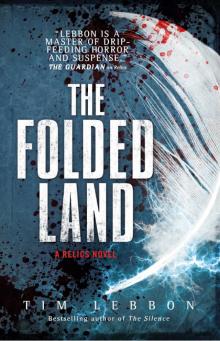 Relics--The Folded Land
Relics--The Folded Land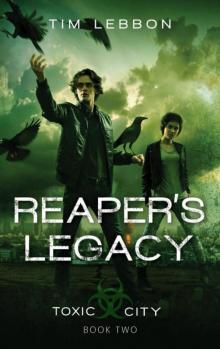 Reaper's Legacy tc-2
Reaper's Legacy tc-2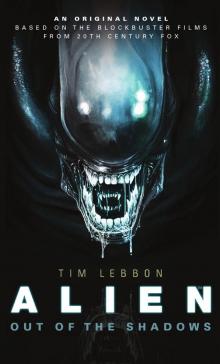 Alien: Out of the Shadows
Alien: Out of the Shadows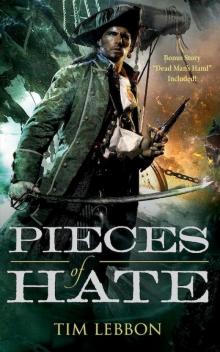 Pieces of Hate
Pieces of Hate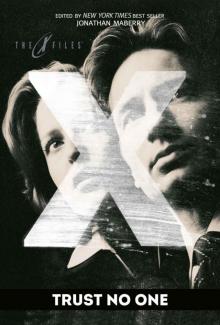 X-Files: Trust No One
X-Files: Trust No One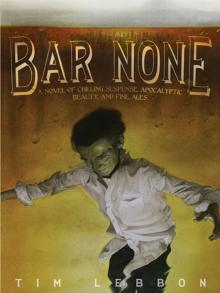 Bar None
Bar None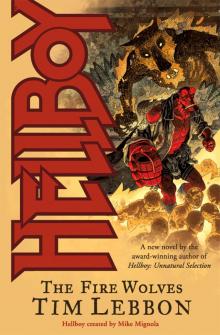 The Fire Wolves
The Fire Wolves